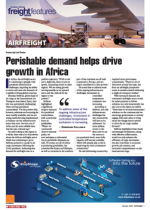In Africa, the airfreight sector is continuing to grapple with persistent infrastructure challenges, impeding its ability to thrive and meet the demands of a rapidly evolving global economy.Brendan Sullivan, global head of air cargo at the International Air Transport Association (Iata), said this was particularly challenging when moving specialised commodities. “On the positive side, however, solutions are becoming far more readily available, and we are seeing methods being implemented to balance out the infrastructure issues that exist. Services out of Africa are far more reliable than was the case a decade ago.”He said looking at the region as a whole, there was a lot of positivity about the African airfreight sector which was continuing to grow. Sullivan pointed to a peak in air cargo movements following the Covid pandemic, indicating that demand for airfreight was on a positive trajectory. “While 2022 saw a slight dip, there is now an uptick, surpassing trends in other regions. We are seeing growth moving steadily on an upward curve and the outlook for the region is very positive.”Sullivan highlighted a significant surge in demand for specialised commodities, with a particular focus on perishables. “Where we consistently observe seasonal peaks, we now anticipate a substantial rise in perishable shipments as well. Of course, not all of Africa is producing perishables, but countries like Kenya and Ethiopia, as well as countries in the southern part of the continent are all well-connected to Europe, and are major contributors to this growth.”He noted that to address some of the ongoing infrastructure challenges, investment in controlled-temperature containers was increasing.According to Sullivan, not only infrastructure challenges but also connectivity will have to be addressed. “As more airlines return to the skies and we see the return to pre-pandemic levels, more belly capacity will become available, which will already play a role in improving the intra-continental connectivity.”He said addressing connectivity required more government commitment. “There is a lot of discussion around the topic, but from an airfreight perspective action is needed towards delivering a single air transport market.”With increased demand, the continent’s airfreight sector would be under pressure to deliver solutions not only domestically, but also across the region, he added. “There have to be more harmonised solutions on the continent and we encourage governments to actively engage with each other to bring about the change that is needed to drive the air cargo market forward.”Sullivan highlighted that timely and strategic investments, along with effective collaboration, would not only enhance the efficiency of cargo movements but also contribute to economic growth, job creation, and increased competitiveness on the international stage.

